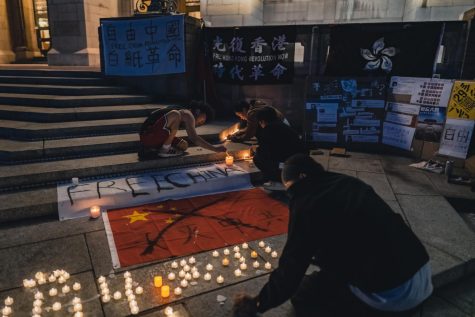Schools need to take more action against sexual violence
One of the best ways to combat sexual violence is a better understanding of consent, and understand how to react if they witness to a sexual assault. At Edmonds Community College, the Violence Prevention Program employs emergency numbers, posters and events to try to raise awareness of the issue, but the office is understaffed.
This is soon to change.
Beginning during spring quarter, the Violence Prevention Program will bring onboard the Violence Prevention Ambassador to help with the group’s important work.
“We need more help,” Amanda Greene, project coordinator for the Violence Prevention Program said. “We’re hoping this position will allow for more students to seek our services due to increased awareness.”
This opening position will first be a volunteer opportunity for about 10-15 hours per week and will end up as a job position for the summer quarter. The staff from the Violence Prevention Program have high hopes in this position and are primarily looking for “someone who is passionate,” as described by Greene.
Many colleges and universities do not take initiative against assault despite the frequency of sexual abuse occurring on campuses. Hopefully these mentalities will begin to change for those who endure abuse as a result of this new position.
As a result of the new position’s announcement on campus, an anonymous person, using the alias “Emma”, has decided to share her story. Through her testimony, she hopes to enlighten young adults, but above all, she hopes to push survivors to speak up rather than continuing to suffer in silence, and to “free themselves and talk with someone.” she believes. “Without talking, you will never make progress on your personal life.”
Emma, 19, was sexually abused when she was in high school. She was only 17. Both she and the man who assaulted her were under the influence of alcohol. When he wanted more than she was comfortable with, he refused to listen to her insistence that he stop. Many victims are afraid to speak out on assault that occurs when they are intoxicated due to a sense of guilt. It is never the victim’s fault, regardless of how much they or their abuser has had to drink.
There is never an excuse. The bruises on her skin disappeared after a few days, but her psychological injuries will never disappear. “I kept it for myself […] until I realized that this pain won’t go away without help,” says Emma. At that moment, this young woman would have liked for someone to tell her ‘I understand you, I believe you, I will help you.’ Indeed, like many others, what prevents her from speaking out is the fear that she will not be believed or taken seriously.
Unfortunately, Emma’s story is far from an isolated case. The Washington Health Assessment declares that “17.7 percent of 10th graders in Washington reported that they had been made to engage in unwanted kissing, sexual touch or intercourse.” It is difficult to acquire accurate statistics due to the sheer amount of victims who do not speak out about their abuse. It is necessary to educate our young people to have respectful behavior towards women just as it is necessary to show them how to cope with a traumatic experience and talking to someone about it without shame.
Greene confirms that “interpersonal violence has always been an issue in our society – especially on college campuses – and the most susceptible group is young women aged 18 to 25.” It is necessary that in the modern, open-minded society we now reside in, people feel safe and attitudes towards them begin to change. This is especially needed on college campuses.
The Violence Prevention Program at EdCC is here to help. In fact, Emma declared in her message that after her assault, she did not have the courage to tell someone who could help about what had happened to her, but she wished that someone around her would have urged her to do so. If someone you know has experienced assault, encourage them to talk to a professional.
“A lot of people think that they don’t have the ability to help others if they are going through something; even more that there’s nothing they can do to stop interpersonal violence from happening,” Greene declared. Some behaviors and actions could have the power to change the future of someone, helping someone or even could prevent something to happen.
Taking action is an important step forward. Providing necessary resources on the campus is for sure essential for the well-being of people who suffered an assault. However, prevention should be top priority, and that starts with educating our youth. It is better to prevent than heal. “Certain speeches, certain acts of prevention can push young people, not all, but some, to ask for help,” believes Emma. This new position might not change everything on the campus. It might not help everyone. But if it can help even one person, then it is worth it to have.





